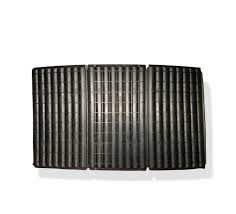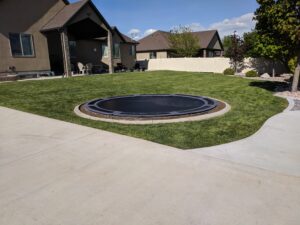When installing an in-ground trampoline, it’s also important to add a retaining wall. You can build a retaining wall yourself or purchase one as a kit, where the panels are usually thin metal or plastic.
Why Are Retaining Walls Necessary?
You need to dig a hole if you’re burying your trampoline and without anything to shore it up, soil will start collapsing back into the pit and the surrounding ground around your trampoline will be ruined. Retaining walls provide several functions:
- Hold back soil and debris from falling back under the trampoline
- Maintain the integrity of the ground around the excavated hole, meaning you can walk and mow right up to the edge of the trampoline
- Secure and stabilize the sunken trampoline for many years of safe bouncing.
Plastic Retaining Walls
Retaining walls can be made of many different things from brick to corrugated metal but plastic or polyethylene is one of the most popular materials.
- Plastic is lightweight which makes it easier to install than heavier metal panels.
- Plastic or polyethylene panels are extremely durable and water resistant, making them a perfect solution to line the frame of an in-ground trampoline.
- Because it’s not 100% rigid, a plastic retaining wall will allow for a little flex from the impact of the trampoline, giving a better jumping experience.
- Plastic retaining walls will be more cost effective than metal panels.
If you want to install a plastic retaining wall around your in-ground trampoline pit, it’s probably easiest to purchase a retaining wall kit with all the panels and hardware in one set. Premade kits are easy to install as the panels are already cut to size, meaning all you need to do is attach them to the frame of your trampoline with the included fasteners.
Retaining wall kits can be bought by themselves or as part of an all in one set with a trampoline and vented safety pads. When purchasing a retaining wall kit for an existing trampoline, check with the manufacturer to make sure it’s compatible with the frame of your in-ground trampoline.
Retaining wall installation may not be something you are comfortable attempting by yourself, in which case, contact a professional service who will be able to install your in-ground trampoline for you.
Image Source: “TDU Retaining Wall System.” Trampolines Down Under. Accessed 12 January. 2023.


